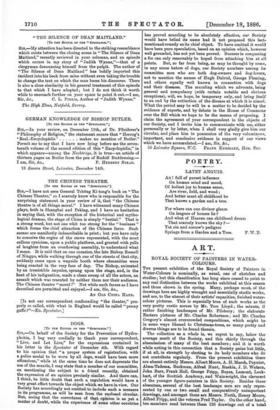THE CHINESE THEATRE.
[TO THE EDITOR OP THE " SPECTATOR."'
SIR,—I have not seen General Tcheng Ki-tong's book on "The Chinese Theatre," so I scarcely know who is responsible for the surprising statement in your review of it, that "the Chinese theatre is of all things moral." I have witnessed many Chinese plays, both in Shanghai and Peking, and I have no hesitation in saying that with the exception of the historical and mytho- logical dramas, the stage of China is simply "bestial.." That is a strong word, but not one whit too strong for the " business " which forms the chief attraction of the Chinese farce. Such scenes are manifestly indescribable in print ; but you have only to conceive the orgies of the stews represented, with the most callous cynicism, upon a public platform, and greeted with yells of laughter from an overflowing assembly, to understand what I mean. It is said that on one occasion, the late Bishop Russell of Ningpo, while walking through one of the streets of that city, suddenly came upon a wayside booth where obscenities were being enacted in the very face of day. The Bishop, animated by an irresistible impulse, sprang upon the stage, and, in the heat of his indignation, made a clean sweep of all the actors, an assault which was resented by neither them nor their audience. The Chinese theatre "moral !" Not while such farces as I have described are permitted and enjoyed.—I am, Sir, &c.,
AN OLD CHINA HAND.
[Is not our correspondent confounding "the theatre," pro- perly so called, with what in England would be called "penny gaffs ?"—ED. Spectator.]










































 Previous page
Previous page